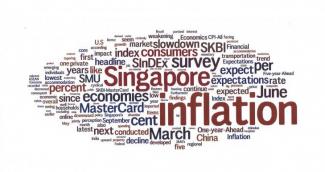
SINGAPORE, 22-JULY-2019 (Monday) - One-year-Ahead headline inflation expectations polled at 2.9% in June 2019. The reading compares to 3.1% polled in March 2019, and the recent second quarter (2018-19) average of 3%. The overall CPIEx Inflation Expectations, after adjusting for potential behavioral biases and re-combining across components, were also at 2.9% in June 2019 compared to 3.1% in March 2019. This also suggests that Singaporeans’ inflation expectations are well-grounded from both the aggregated and the components-wise comparisons. One-year-ahead inflation expectations, adjusted for behavioral biases, dropped to 2% in June 2019, reverting to its most frequently polled value since inception in June 2018 (Fig 3).
Excluding accommodation and private road transportation related costs, the One-year-Ahead Core CPIEx inflation expectations stayed unchanged 3.1% in June 2019 from March 2019. For a subgroup of the population who own their accommodation and use public transport, the One-year-Ahead CPIEx core inflation expectations inched up to 3.1% from 3.0% in March 2019. This subgroup’s expectations of core inflation follow the Singapore Core Inflation Expectations readings, as unlike the general population they are not exposed to private road transportation or accommodation expenses.
DBS-SKBI SInDEx survey was augmented in June 2018, based on a joint research study conducted by SMU researchers in collaboration with the Monetary Authority of Singapore (MAS) and the Behavioral Insights Team, where respondents were polled about their perceptions of components of the Consumers Price Index (CPI) and adjusted for possible behavioral biases prevalent in online surveys.
Based on the recommendations of that study the research team had, since March 2019 polled the one-year-ahead inflation expectations of all of the major components of CPI-All Items inflation. Compared to March 2019, the June 2019 survey revealed inflation expectations across all categories have either stayed the same or dropped quarter on quarter, although without the same quarterly benchmark we were not able to conclude if the moderation is a peculiarity or a natural quarterly seasonality of these indices. The component inflation expectations indices that dropped in June 2019 survey compared to March 2019 are healthcare, education, recreation and communications.
Dr. Taimur Baig, DBS Chief Economist, commented, “Despite a weakening of growth in recent quarters and sub-1% headline inflation for several years, inflation expectations continue to hover around 3% in Singapore. This interesting finding suggests factors such as perceptions about broader cost of living continue to persist in a sticky manner.”
For the longer horizon, the Five-year-Ahead CPIEx inflation expectations in the March 2019 survey edged down to 3.9% from 4.1% in March 2019. The current polled number is lower than the long-term (from 2012-19) average of 4.2%.
The Five-year-Ahead CPIEx core inflation expectations (excluding accommodation and private road transportation related costs) stayed unchanged at 3.8% in June 2019 from March 2019. Overall, the composite Five-year-Ahead SInDEx5 dropped to 3.8% in June 2019 from 3.9% in March 2019, much lower compared to its historical average of 4.1%.
SMU Assistant Professor of Finance and Principal Investigator of the DBS-SKBI SInDEx Project, Aurobindo Ghosh observed, “The World Bank, in its semiannual Global Economic Prospects (June 2019), have underscored the fragility in the global growth momentum with downside risks including a significant drop in global trade growth and consequent negative impact on business confidence. These headwinds to global growth might have slightly dampened inflation expectations in Singapore as well.
“Generally, on a year-on-year basis, there have been smaller declines in accommodation costs and private road transportation costs have picked up, although increases in the costs of food, fuel & utilities and other travel & transport have moderated in recent months. Furthermore, overall and non-energy import prices have been low. Softening labor market have also somewhat reduced the price pressure passed through to consumers. All these counterbalancing factors in net have caused overall inflation expectations CPIEX to move marginally downwards while the Core CPIEx Inflation expectations have remained unchanged. The DBS-SKBI survey also have provisions for adjusted indices to account for potential behavioral bias in survey responses. The median inflation expectations, after adjustment for behavioral biases for both Headline and Core Inflation Expectations, drops to 2% and 2.2% respectively, which are lower than the unadjusted indices reported. These are consistent with several academic studies, such as the Michigan-Reuters Survey in the US and the more recent surveys in New Zealand on persistent biases in inflation expectations.” Prof. Ghosh added.
For more information, contact:
Teo Chang Ching (Mr)
Office of Corporate Communications & Marketing
Singapore Management University
DID: 6828 0451
Mobile: 9431 8353
Email: ccteo [at] smu.edu.sg
Jolyn Tan
Group Strategic Marketing & Communications
DBS Bank
Tel: (65) 6878 6337
Mobile: (65) 9336 4570
Email: jolyntan [at] dbs.com (jolyntan[at]dbs[dot]com)